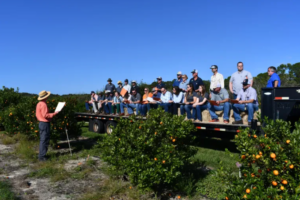
Beginning this month, Citrus Nursery Source (CNS) transitions to Citrus Industry magazine after 14 years in Florida Grower magazine. For those unfamiliar with this column, CNS covers citrus industry issues that are of potential interest to nurseries and the growers they serve. Read more.
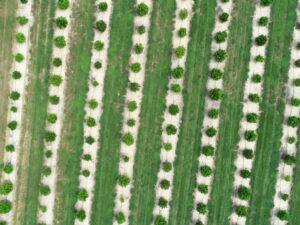
It is typical for research and program planning to begin well before the current year’s programs and projects are completed and reports are filed. This always presents a challenge. However, the rapidly changing dynamics in the citrus industry has impacted this process in a profound way. The loss of growers, acreage and infrastructure is front and center on everyone’s mind. Read more.
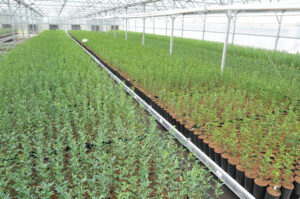
The New Varieties Development & Management Corp. (NVDMC) board of directors has completed its 2023-24 budgeting process. Like other citrus industry organizations and private companies, the NVDMC board sought to address the need for immediate and short-term benefits, without abandoning a necessary focus on the future. Read more.

The horticultural characteristics of new citrus varieties are important, especially in the era of HLB when disease tolerance is critical. But how the fruit tastes and other consumer attributes are equally important. That’s why citrus variety display days are vital in citrus breeding. Read more.
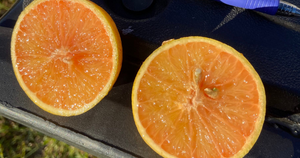
My maternal grandmother used to say, “Getting old ain’t for sissies.” There is some universally applicable wisdom in that short saying. Sometimes the mere act of survival is an accomplishment. Consider the challenges that a 50- to 75-year-old citrus tree has faced during its life in Florida. Read more.
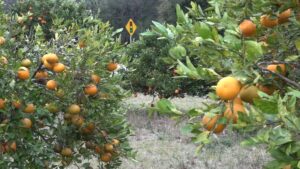
A bleak outlook for Florida’s orange industry has citrus growers looking toward a future filled with new orange varieties. At The Orange Shop in Citra, a fresh fruit gift business, owner Peter Spyke is focused on that future. It’s why the third-generation citrus farmer is on a mission to help fight “citrus greening.” The incurable, insect-borne plant disease has crippled Florida’s orange crop for more than a decade. Read more.
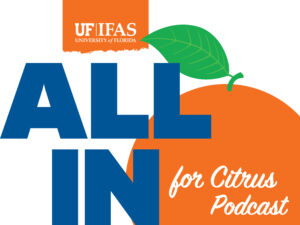
The podcast, “All in for Citrus,” features short interviews with scientists working to find solutions to citrus greening and other devastating citrus diseases. The University of Florida Institute of Food and Agricultural Sciences and Southeast AgNet partnered to provide the latest news on citrus-related research in a monthly podcast. In episode 39, UF/IFAS discusses the licensing and release process for UF citrus varieties. Listen in at the 8:25 minute mark.
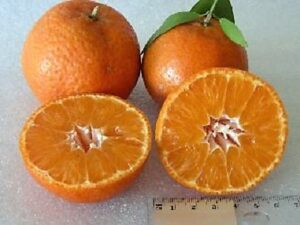
The executive directors of two organizations that play a vital role in getting citrus varieties into the hands of growers summarize how the process works. They are John Beuttenmuller with Florida Foundation Seed Producers (FFSP) and Peter Chaires with New Varieties Development & Management Corporation (NVDMC). Read more.
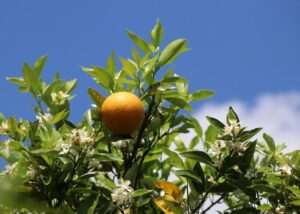
While no solution for citrus greening has been identified, scientists continue to make progress toward producing workable tools to manage the disease. To this end, the University of Florida’s Institute of Food and Agricultural Sciences is hosting an open house and field day on November 16 that will feature 20 hands-on exhibits showcasing the latest research findings. Read more.
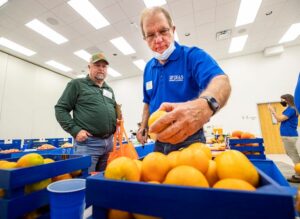
Researchers shared science-based tactics for growers to use against citrus greening disease during an open house Tuesday at the Lake Alfred experiment station. While there still remains no cure for the disease that has decimated the citrus industry in Florida, the latest research offered growers hope for making profits from infected groves throughout the peninsula. Read more.

The citrus industry is devoting extensive resources and time to new variety development, said Peter Chaires, executive vice-president of Lakeland, Fla.-based Florida Citrus Packers. Chaires said meetings with growers, packers and processors emphasize putting new varieties in front of the industry. In five years, he said there will be new varieties entering the commercial market. Read more.
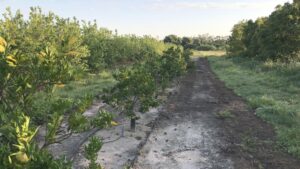
Spanning back to its infancy, exploration has been one of New Varieties Development & Management Corp.’s (NVDMC) primary objectives. Make no mistake, Florida’s highest and best hope for citrus varieties of commercial significance lies in ongoing support of local breeding programs. Florida’s climatic conditions are unique and challenging. Read more.
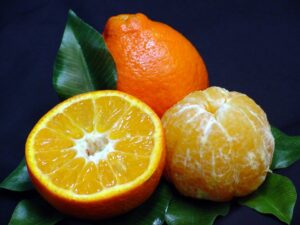
Fred Gmitter and Jude Grosser discuss some relatively new varieties they like – a mandarin, some oranges and a pummelo-grapefruit hybrid. Gmitter and Grosser are University of Florida Institute of Food and Agricultural Sciences (UF/IFAS) plant breeders at the Citrus Research and Education Center. Read more.
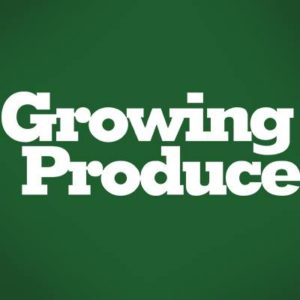
Fall has arrived (at least according to the calendar), and we will soon have an opportunity to resume citrus variety display and field day events, which provide a great way to see products from the in-state, plant-breeding programs and help identify those selections that appear to have market potential. Displays will include fresh and processed selections. Read more.

Efforts to combat citrus greening disease, which for nearly two decades has devastated groves, could soon lead to a new University of Florida-backed variety of citrus on the market. Michael Rogers, director and professor at the University of Florida IFAS Citrus Research & Education Center, said among new varieties that are more tolerant to citrus greening, technically called huanglongbing, or HLB, is a “Gator Bites” brand. Read more.
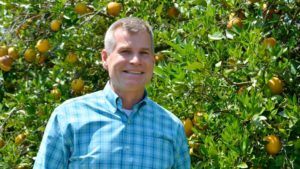
The citrus industry and the entire agriculture sector have great opportunities for young people looking for rewarding careers. There is a critical need to increase the number of young people interested in careers in ag, particularly on the production ag side. The use of technology and the rate of change is rapid. The University of Florida, Florida Southern, and Warner University are doing a great job developing talent for the industry. Read more.
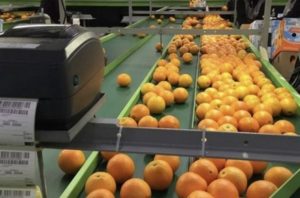
The Florida citrus crop this season isn’t likely to see significant growth in volumes. But growers and shippers are readying for strengthened demand. “The big thing this year will be the impact of Texas from last season with their freeze. Some growers may be completely out while others will be short–but we know Texas will be down. The major impact on Florida will be on grapefruit and oranges.” Read more.
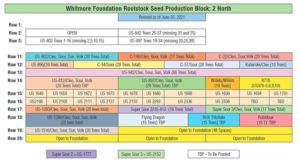
The Florida Citrus Research Foundation (FCRF) provides oversight and support for the A.H. Whitmore Foundation Farm near Leesburg. The foundation and farm were initiated in 1959 as a means of supporting the Florida citrus industry through citrus field research, trial plantings, and cropping new citrus crosses for evaluation and data collection. Read more.
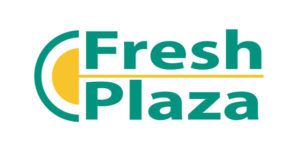
A researcher from the University of Florida Institute of Food and Agricultural Sciences recently determined how bacterium causes the devastating citrus disease HLB. UF/IFAS Citrus Research and Education Center director Michael Rogers provided the basics of the breakthrough discovery while meeting with the Highlands County Citrus Growers Association governing board on September 9. Read more.
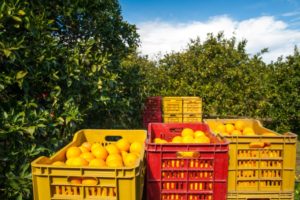
Florida orange and red grapefruit production, already at historically low levels, will likely decline for years, according to a leading citrus economist. Tom Spreen, University of Florida Institute of Food and Agricultural Sciences professor emeritus, calculated Florida crop output through the 2031-32 season based on various yield and tree replacement assumptions. Read more.
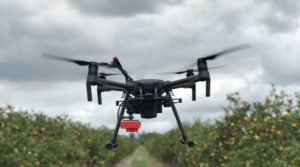
University of Florida researchers are using artificial intelligence to help citrus growers better forecast their seasonal production. So far, they’ve found in a preliminary study that their technology predicts yields with 98% accuracy. Read more.
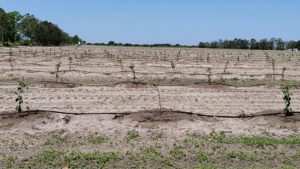
Spencer Johnson might say that “someone moved our cheese.” But Florida citrus folks operating in an HLB-endemic environment know that the cheese has its own passport. This is to say that circumstances are shifting, and funding is quickly being redirected to address the most current pain. Read more.
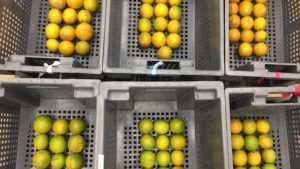
The 2021-2022 citrus season is upon us and New Varieties Development & Management Corp. (NVDMC) has a busy slate of projects lined up, subject to funding approval. Like other organizations in these challenging times, the NVDMC board of directors is gearing-up to do more with less. Read more.
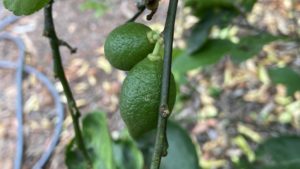
The Associated Press titled it “The Great Green Citrus Crisis of 2014.” It was the perfect storm of circumstances that pushed lime prices from the mid-$20 range to $80 and ultimately $130 per case. The price of all things made with lime or associated with lime suddenly escalated. Read more.
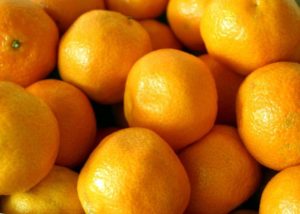
Despite a decrease in citrus production, the Florida citrus industry contributed more value to the state of Florida in 2019-20 than the previous season. According to a study conducted by the University of Florida… Read more.
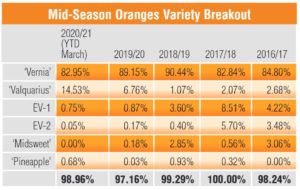
Orange growers are certainly watching and perhaps trialing new orange varieties in each of Florida’s key maturity windows. Better oranges are needed to feed the state’s processing sector, with a higher sense of urgency for early/mid-season varieties. Read more.
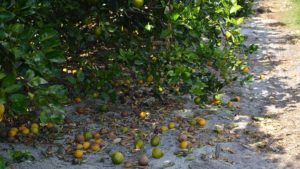
Fruit drop has always occurred in Florida citrus groves, but it has become increasingly problematic in recent years. HLB is certainly a major culprit in fruit drop. Tripti Vashisth, an Assistant Professor of Horticultural Science and a Citrus Extension Specialist, has been studying the problem to learn more about the origins of fruit drop and what you can do about it. Read more.
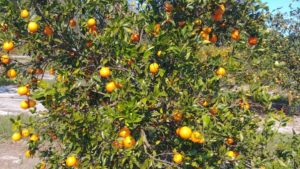
Somewhere among the peaceful bliss of pre-Disney Orlando, USDA’s Dr. Jack Hearn produced a ‘Lee’ x ‘Nova’ mandarin hybrid that would ultimately excite and frustrate Florida’s citrus industry. Labeled the 6-13-44 in Florida, this selection was known for producing large, seedless, peelable fruit of exceptional flavor. Read more.
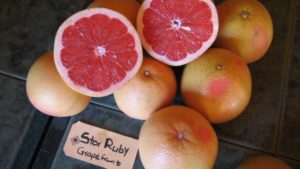
Florida’s unique climate has long produced some of the world’s best quality grapefruit. Florida grapefruit are considered a premier offering, popular throughout the world for superior taste and eating quality. Perhaps more than any other citrus, grapefruit benefits from Florida’s heat, humidity, and subtropical rainfall. It’s right at home here. Read more.
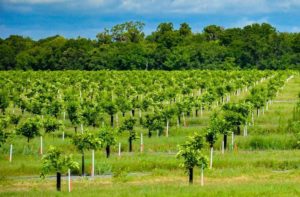
The Citrus Research and Development Foundation (CRDF) is establishing a new project to evaluate the most promising citrus rootstocks in grower field trials. The rootstock trials are projected to be planted in the spring or summer of 2022. The goal will be to identify plant material with the traits needed for growers to realize the highest possible pound solids per acre and increased tree viability in the HLB era. Read more.
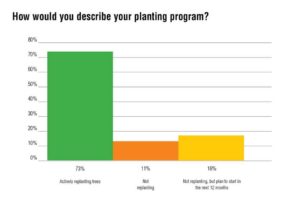
Citrus growers in Florida know the statistics on the impact that HLB has had all too well. Production down by more than 70% and acreage dipping below a half-million acres. Estimates for this season also point to another year-over-year decline in production. Despite the scale of damage brought by HLB, citrus growers remain persistent and believe the industry can survive… Read more.
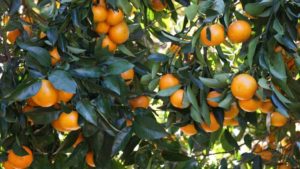
The status of the ‘Orri’ mandarin permeated 2020 coffee shop talk among specialty citrus fruit growers. It was widely known that the patent had expired, and it was uncertain whether ‘Orri’ would become public domain or continue forward as a managed variety. Though growers continue to commit resources to trialing new experimental selections and hone their production practices with recently released Florida varieties, many are interested in…Read more.
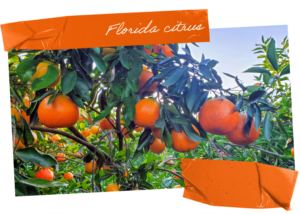
This should be a good year for Florida citrus with grower-shippers reporting good growing conditions for oranges and grapefruit, and some suppliers adding increasingly popular easy peelers, like the ones that have taken off in California.
Volume will be down in some categories, however. Read more.
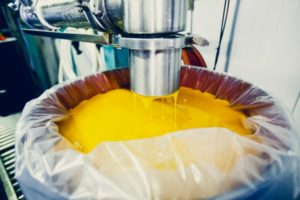
There is some excess capacity in Florida should the citrus greening situation improve, and Florida increases its box production. Greening has decreased the yield of boxes per tree. With less impact from greening, total boxes will grow and hopefully the season will stretch longer. Traditionally, we processed to the end of June. Read more.
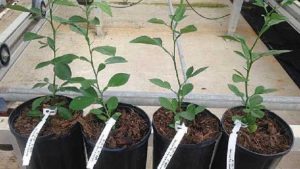
Throughout the past decade, Florida citrus growers have had access to a significant number of new experimental citrus cultivars. Some were targeted to the processed segment, some have potential dual use, and some were specific to the needs of the fresh market. The ultimate long-term value of varieties for processing will be determined through… Read more.
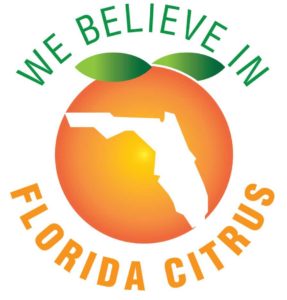
When HLB was confirmed in Florida in 2005, there were some pronouncements that trees infected with the disease would only survive for a few months, maybe a year. While the battle has been hard — production has been reduced by 70% — you are still producing fruit, and many believe the industry remains viable despite the disease. Read more.
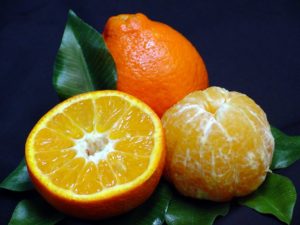
The Sugar Belle® is a unique mandarin hybrid that resembles a Honeybell (Minneola), but trends towards smaller sizes and has better color and flavor. It has proven to be quite HLB tolerant in all circumstances. Fruit typically matures in December and can be low-seeded if the trees are isolated. It performs well on all rootstocks except Cleo. The juice is increasingly popular when blended with orange. Nursery, Packer and Grower agreements are available. View more information on the Sugar Belle website.
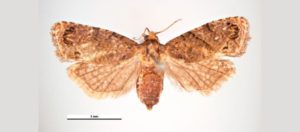
The U.S. Department of Agriculture’s Animal and Plant Health Inspection Service (USDA/APHIS) announced it is authorizing the importation of cold-treated fresh citrus from South Africa into all U.S. ports of entry. Previously, APHIS restricted the entry of cold-treated citrus fruit from South Africa to four U.S. ports that have cold-treatment facilities. Read more.
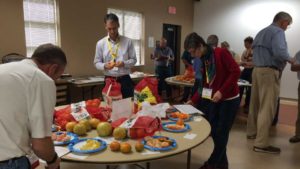
Virtual communications platforms, though tiresome, have certainly enabled business communications to continue and, in some cases, foster more effective and inclusive dialogue than the “old-fashioned” face-to-face meetings. However, the virtual meetings that will forever be associated with 2020 have their limitations. Case in point, citrus variety displays. Read more.
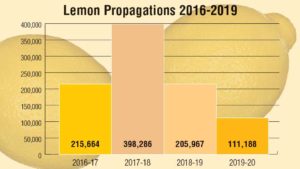
Florida citrus growers remain interested in diversifying their planting portfolio and continue to question whether lemons should be a consideration. Anyone navigating back roads in primary Florida citrus production areas has certainly seen significant lemon acreage going in the ground. The trees have a distinctive appearance and really catch the eye. Read more.
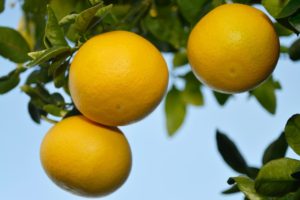
Dan Richey, president of Riverfront Packing Company, gave an update on trade issues impacting fresh Florida citrus during the recent virtual citrus Packinghouse Day meeting.
Richey, also a member of the Agricultural Trade Advisory Committee, says foreign sales are especially important for Florida citrus. Read more, or view the recorded presentation here.
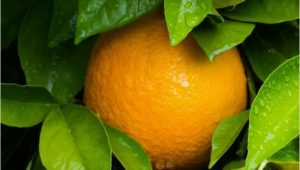
The U.S. Department of Agriculture (USDA) has issued a final rule requiring citrus handlers in Florida to register with the Citrus Administrative Committee in order to ship regulated citrus outside the production area beginning in the 2019-2020 fiscal year. Read more.
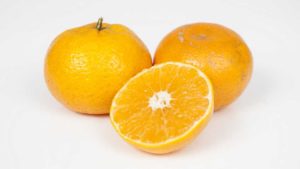
Florida’s citrus breeding programs may be clear and present evidence that motivation comes from working on things you care about. Breeding is a continuum and requires one eye on the present and one eye on the future. Breeding projects don’t always go as planned, but with constancy of focus, and an unbridled determination to deliver, good things happen.
Read more.
During the first couple months of the coronavirus crisis, it was as if time stood still. The rise of COVID-19 caused serious disruption in industry communications and the facilitation of public discourse. Meetings, conventions, and a myriad of other functions were cancelled out of caution and to remain in compliance with crowd size limitations and social distancing guidelines. However, there are certain discussions that are best done face to face. In agriculture, photos and other visual aids (charts, graphs, photos, etc.) are often needed to engage participants in robust dialogue about complex issues. Read more.
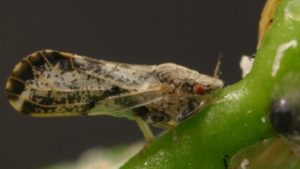
An Asian citrus psyllid (ACP) sample – confirmed positive for Candidatus Liberibacter asiaticus (CLas), the bacteria that causes Huanglongbing (HLB) – was recently collected from a commercial citrus grove in the Woodcrest area of Riverside County in California.
The find, a single adult psyllid, which was reported Friday by California’s Citrus Research Board (CRB), was confirmed by the CRB’s Jerry Dimitman Laboratory. Read more.
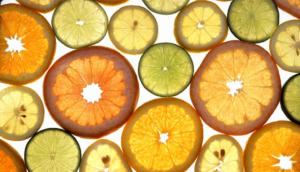
Expanded fresh fruit options have influenced the availability of citrus fruits on the national market over time, according to data from the U.S. Department of Agriculture’s Economic Research Service (ERS).
The annual study that shows per capita supplies of fresh fruits for U.S. consumers demonstrated that 14% of all fruit supplies in 2018 were citrus. This number – especially relative to a few decades ago when in 1970 the same category made up a 24% share of fresh fruit supplies – is of note because it points to a bigger trend in citrus availability. Read more.
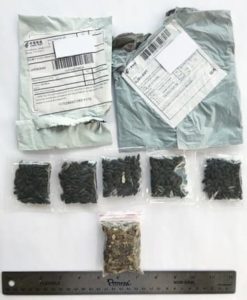
Anyone who receives suspicious, unsolicited packages of seeds in the mail is warned not to open them, but to report them, the Florida Department of Agriculture and Consumer Services warned Monday.
The agency said the packets might bear Chinese characters and possibly the name China Post. They might also be labeled as jewelry. The packets have been reported in numerous states so far, including Virginia, Kansas, Washington, Oklahoma, Louisiana, Utah and others, the agriculture department said. Read more.
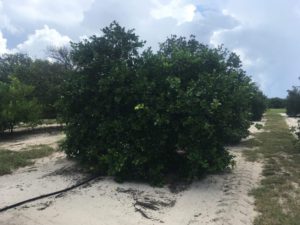
Two citrus breeding programs have identified several rootstocks that can currently be planted with confidence when combined with appropriate scions, including mid- and late-season oranges, and grown with emerging enhanced nutrition programs. These citrus breeding programs are at the University of Florida Institute of Food and Agricultural Sciences (UF/IFAS) Citrus Research and Education Center (CREC) and the U.S. Department of Agriculture (USDA) Agricultural Research Service (ARS). Read more.
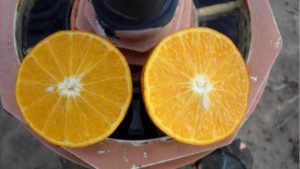
The Temple tangor has ridden the waves of popularity — and disdain — over the past century. To honor its approximate 100th birthday in Florida, it may be worth revisiting its interesting history and present condition. Based on recent conversations, there are clearly fewer people working in Florida’s citrus industry with any first-hand knowledge of the Temple, its origin, or significance. Read more.
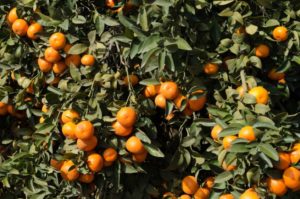
The relatively mild winter conditions over the last two decades have led to a resurgence of interest in cold-hardy citrus in Florida. Growers were looking for a low-seeded citrus variety that was sweet, easy to peel and had moderate cold tolerance. In 2009, the first Florida nurseries were licensed to grow Tango, a low-seeded (less than five seeds per fruit when grown in a mixed block) Murcott. Read more.

This year’s Florida Grower® magazine Citrus Achievement Award winner, along with three previous winners, covered topics ranging from the coronavirus, markets, new varieties, living with HLB, and much more. Listen to the leading voices in Florida citrus on the recording here.

The prevailing conversation with Florida’s citrus industry this past spring seemed to center around field trials. Clearly, the breeding programs have successfully filled the pipeline with selections with potential utility for fresh, processed, and dual-purpose applications. Some folks are questioning whether sufficient trials exist to collect, compile, and disseminate data to support planting decisions for processed growers. Read more.
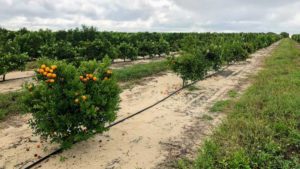
Recent industry discussions related to plant improvement and evaluation of new citrus material have highlighted the need for a process with more scientific design than FAST TRACK (an expedited process developed for UF/IFAS fresh selections) and faster than traditional replicated field trials.
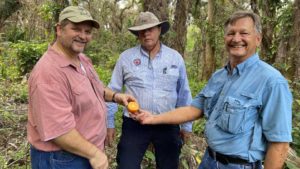 Dr. Bob Hartman, CEO of Classic Caladiums, spent his early years in Miami. When he was a young teen, his father purchased 20 acres in Palmdale, FL. The south side of the property was comprised of densely wooded hammock. The hammock doubled as Hartman’s playground and adventure land. Consequently, he knew the property like the back of his hand.
Dr. Bob Hartman, CEO of Classic Caladiums, spent his early years in Miami. When he was a young teen, his father purchased 20 acres in Palmdale, FL. The south side of the property was comprised of densely wooded hammock. The hammock doubled as Hartman’s playground and adventure land. Consequently, he knew the property like the back of his hand.
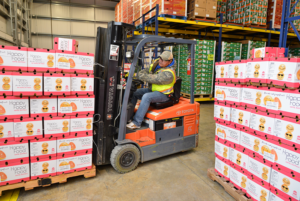
Social distancing and enhanced sanitation practices have been adopted in many Florida groves and facilities in an effort to curtail spread of the coronavirus.
“Growers are making the necessary adjustments by increasing sanitation and keeping workers separated,” said Steve Smith, executive vice president of Gulf Citrus Growers Association. “The larger growers with multiple locations are keeping crews separated into small groups.” Read more.
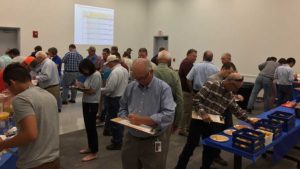
Huanglongbing (HLB) is a disease that has devastated the Florida citrus industry, threatens the entire U.S. citrus industry, and globally is rapidly spreading. Florida’s citrus production is 90% sweet orange, which is quite sensitive to HLB. The heavy reliance on sweet orange for Florida citrus production makes the industry especially vulnerable to diseases that are damaging to this type of citrus.

Florida’s outstanding in-state citrus breeding programs at UF/IFAS and USDA-ARS have been hard at work developing new selections for the processed and fresh fruit pipelines. More than 40,000 unique plants are in the field, many of which fruited this year for the first time. Read more.
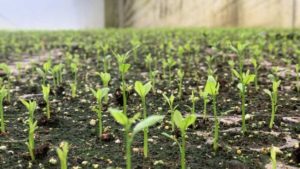
The Florida Citrus Research Foundation (FCRF) is the owner and co-managing entity of the A.H. Whitmore Foundation Farm located between Leesburg and Groveland. After the movement of the U.S. Horticultural Research Laboratory (USHRL) from Orlando to Ft. Pierce, the continued value and usefulness of the Whitmore Farm was called into question. Read more.
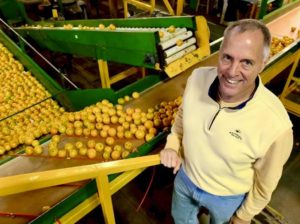
Fifty-five years ago, the writer John McPhee visited Florida as part of his research for the elegant little book he titled simply “Oranges.” He noted the roughly 100-mile ridge running between Leesburg and Sebring had “the most intense concentration of citrus in the world” and likened the scent it produced to a sedative. Read more.

Florida citrus nurseries and growers have been quick to adopt new varieties for trial and commercial production on a range of scales. Because many of these citrus varieties are made available with limited or no data, production plans are being developed on the fly. This certainly isn’t ideal. Read more.
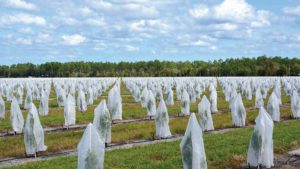
All farms evolve over time as growers try new crops that fit their ground and economic situation. Some crops are a hit and others are not. That’s why small-scale trials are important to find winners or weed out losers before going into new, large-scale plantings.
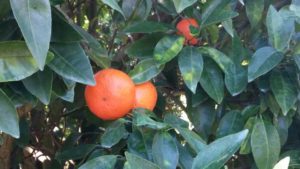
There is certainly no shortage of regulations, statutes, and rules governing Florida’s citrus industry. This fact is particularly obvious to those new to the party. It is sometimes puzzling why an industry would self-impose such a situation. Was the master plan to regulate ourselves into prosperity? Quite the contrary. Read more.

Mark Ritenour with the University of Florida Institute of Food and Agricultural Sciences (UF/IFAS) reports on evaluations of new fresh mandarin and sweet orange selections. Ritenour is a professor at the Indian River Research and Education Center in Fort Pierce.
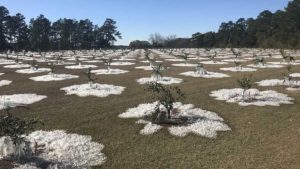
The level of interest and curiosity associated with North Florida and South Georgia citrus production is escalating. Some Floridians are reserving judgement, some are convinced that it is going to be a disaster, and others wish they could magically relocate their groves and infrastructure to the Northern counties. Read more.
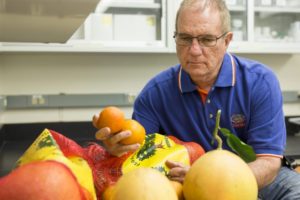
Fred Gmitter provided an update at Citrus Expo on University of Florida Institute of Food and Agricultural Sciences (UF/IFAS) citrus varieties, including OLL-20 and Bingo. Gmitter is a UF/IFAS citrus plant breeder and geneticist at the Citrus Research and Education Center.
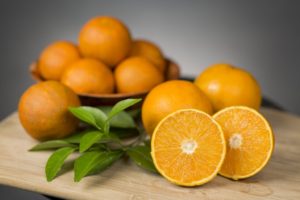
As citrus growers, packers, processors, gift-fruit shippers and others taste, feel and smell the latest varieties from the University of Florida Institute of Food and Agricultural Sciences (UF/IFAS), they hope their taste buds explode with flavor and that a fresh aroma fills the room at the Citrus Research and Education Center (CREC).
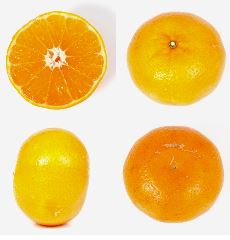
New fresh citrus fruit selections continue to be developed and released by the University of Florida Institute of Food and Agricultural Sciences (UF/IFAS) and the U.S. Department of Agriculture.
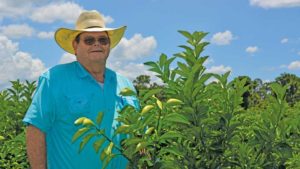
When you are told the experimental citrus grove you have planted is like no other in the country, you know it is a sign of the times and changes brought on by citrus greening.
For the Florida citrus industry, last year was considered a rebound season after the big blow Hurricane Irma dealt in September 2017. And it was. The 2019-2020 citrus season is now officially underway in the Sunshine State with USDA’s initial citrus crop estimate in the books. Pre-season predictions from citrus economist Elizabeth Steger pegged the orange crop at 73 million boxes – a touch above last season’s final tally of 71 million boxes and change.

The fall brings numerous opportunities for the Florida citrus industry to engage with the plant improvement teams at the UF/IFAS and USDA-ARS.
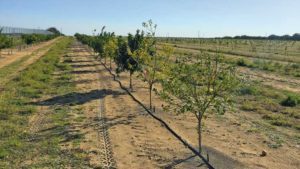
When it comes to planting decisions, there’s no substitute for walking the groves.
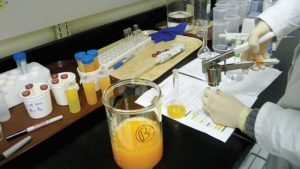
Join the conversation as a new committee leads the charge to developing new varieties in the wake of an HLB endemic.
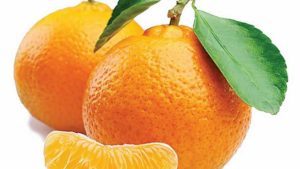
Unique late-season, seedless Mediterranean triploid is now an option for Florida citrus producers.
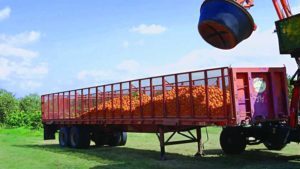
Despite challenges, all phases of the industry are working toward a brighter future.
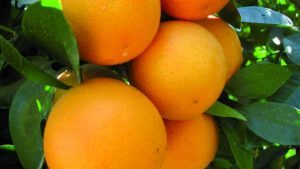
When will ‘Ruby’ Valencia be ready to shine in the citrus marketplace?
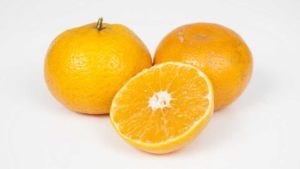
Despite challenges, all phases of the industry are working toward a brighter future.
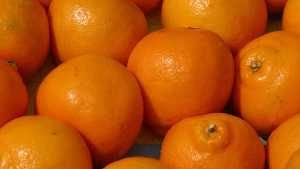
For local producers interested in trialing the latest selections in their grove, opportunity may come knocking this spring.
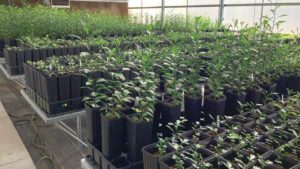
Florida budwood registration staff continues to focus on safe plant material for local growers.